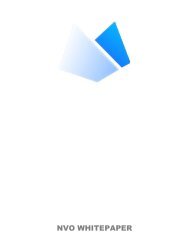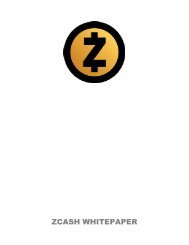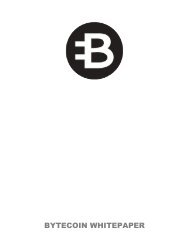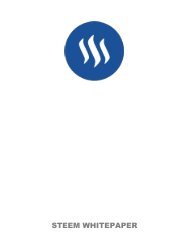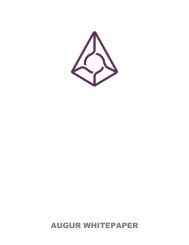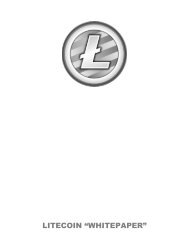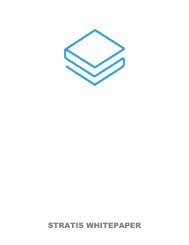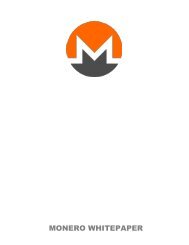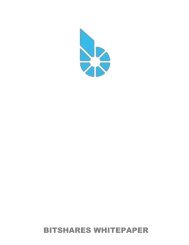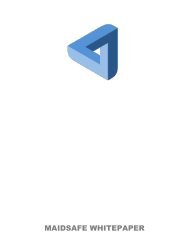Whitepaper - Ethereum Classic With Cover
Create successful ePaper yourself
Turn your PDF publications into a flip-book with our unique Google optimized e-Paper software.
<strong>Ethereum</strong> <strong>Classic</strong> Documentation, Release 0.1<br />
• Omkara<br />
• tflux99<br />
• xyzether<br />
1.2 <strong>Ethereum</strong> Clients<br />
1.2.1 Choosing a client<br />
Why are there multiple <strong>Ethereum</strong> clients?<br />
The <strong>Ethereum</strong> clients are very analogous to a Java VM or .NET runtime.<br />
They enable you to execute “<strong>Ethereum</strong> programs” on your computer. They are implemented to a written specification<br />
(the Yellow Paper) and by design are interoperable and somewhat “commodity”.<br />
From the earlier days of the project there have been multiple interoperable client implementations across a range<br />
of different operating systems. That client diversity is a huge win for the ecosystem as a whole. It lets us verify<br />
that the protocol is unambiguous. It keeps the door open for new innovation. It keeps us all honest. However, it<br />
can be very confusing for end-users, because there is no universal “<strong>Ethereum</strong> Installer” for them to use.<br />
As we enter the Homestead phase, the Go client is very, very dominant, but it hasn’t always been that way, and<br />
won’t necessarily be that way in the future. All of the clients except ethereumH have Homestead-compatible<br />
releases. The table below contains links to the latest release.<br />
Client Language Developers Latest release<br />
go-ethereum Go <strong>Ethereum</strong> Foundation go-ethereum-v1.4.10<br />
Parity Rust Ethcore Parity-v1.2.2<br />
cpp-ethereum C++ <strong>Ethereum</strong> Foundation cpp-ethereum-v1.3.0<br />
pyethapp Python <strong>Ethereum</strong> Foundation pyethapp-v1.3.2<br />
ethereumjs-lib Javascript <strong>Ethereum</strong> Foundation ethereumjs-lib-v3.0.0<br />
<strong>Ethereum</strong>(J) Java ethereumJ-v1.3.0-RC5-DaoHardFork<br />
ruby-ethereum Ruby Jan Xie ruby-ethereum-v0.9.3<br />
ethereumH Haskell BlockApps no Homestead release yet<br />
1.2.2 Installing a Client<br />
There are a number of “official” clients whose development has been funded from the resources administered by<br />
the <strong>Ethereum</strong> Foundation. There are also various other clients which have been built by the community or by other<br />
commercial entities.<br />
Read more about the specific clients in the specific client sections in this chapter.<br />
What should I install on my desktop/laptop?<br />
If you have a laptop or desktop machine, you should probably just install the <strong>Ethereum</strong> Wallet and you are done.<br />
• Download the latest <strong>Ethereum</strong> Wallet ZIP from Github.<br />
• Unzip wherever you like<br />
• Click on the executable (<strong>Ethereum</strong>-Wallet, <strong>Ethereum</strong>-Wallet or <strong>Ethereum</strong>-Wallet.app)<br />
• The block-chain will be downloaded<br />
The <strong>Ethereum</strong> Wallet is a “single dapp” deployment of the Mist Browser which will be the centerpiece of the<br />
Metropolis phase of development, which comes after Homestead.<br />
Mist comes with bundled go-ethereum and cpp-ethereum binaries and if you are not running a command-line<br />
<strong>Ethereum</strong> client when Mist starts then it will start running one of the bundles clients for you.<br />
1.2. <strong>Ethereum</strong> Clients 17



